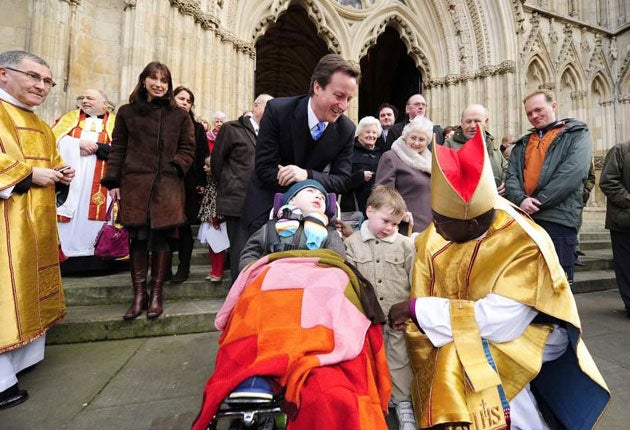Church leaders attack greedy financiers and the free market
Archbishops use Christmas messages to call for a more generous form of capitalism

Christian leaders used their Christmas Day messages yesterday to condemn the worst excesses of capitalism – such as "ruthless gain" at the expense of the poor – and the idea of the free market as a "blind force like gravity".
The Archbishop of York, Dr John Sentamu, railed against bankers who lent money irresponsibly, while the head of the Catholic Church in England and Wales, Cardinal Cormac Murphy-O'Connor, spoke of "an obligation to act in ways that promote the common good".
The Archbishop of Canterbury, Dr Rowan Williams, spoke in his sermon of the good that could come from "small and local gestures" and advised against waiting for a heroic figure to solve the world's problems.
Pope Benedict XVI, speaking in the Vatican, attacked what he called "the twisted logic of confrontation and violence" in the Middle East and urged Israelis and Palestinians to "reduce the tension" and find "just and enduring solutions to the conflict which scars the Holy Land".
Dr Sentamu addressed a congregation of about 1,200 people, including the Tory leader David Cameron and his family, at York Minster. He condemned usury and warned banks against "exploitative lending" as families and businesses battled economic uncertainty. "If I enrich myself at my poor neighbour's expense when they are in financial straits, I certainly have the wrong attitude on the matter," he said. "True charity repudiates the idea of personal gain as a result of lending money to make ruthless gain – usury – bringing about permanent disappropriation and enslavement.
"Clearly the way to come closer to God is to be generous and honest towards our fellow human beings."
Dr Sentamu urged Britons to rediscover the spirit of wartime solidarity in an attempt to see their way through the current financial turmoil. "In the present economic crisis, we need to rediscover that spirit of togetherness that helped the British people during the Second World War to stand together in the face of food rationing and the Blitz," he said. "We had better stand together or we will all hang separately economically."
In London, Cardinal Murphy-O'Connor presided over what is thought to have been his last Christmas Midnight Mass as Archbishop of Westminster. He said he was shocked by "spectacular" instances in which financiers had acted in a way that meant the public would struggle to regain trust in them.
The cardinal, while admitting that he was "no expert" on economics, said the central message should be that the interests of ordinary people should be paramount and not subjugated to a dogmatic economic theory.
"Christianity neither condemns nor canonises the market economy," he added. "It may be an essential element in the conduct of human affairs, but we have to remember that it is a system governed by people, not some blind force like gravity. Those who operate the market have an obligation to act in ways that promote the common good, not just in ways that promote the interests of certain groups."
In his sermon, Dr Williams advised against looking for "larger-than-life" heroes to come to the rescue. President-elect Barack Obama was being loaded with many such messianic expectations, he said.
"The gospel tells us something hard to hear: that there is not going to be a single charismatic leader or a dedicated political campaign or a war to end all wars that will bring the golden age," Dr Williams told worshippers at Canterbury Cathedral. "It tells us that history will end when God decides, not when we think we have sorted all our problems out; that we cannot turn the kingdoms of this world into the kingdom of God and his anointed; that we cannot reverse what has happened and restore a golden age."
In her festive broadcast, the Queen also acknowledged Britain's economic problems and the "insecurity" felt by people around the country.
Join our commenting forum
Join thought-provoking conversations, follow other Independent readers and see their replies
Comments